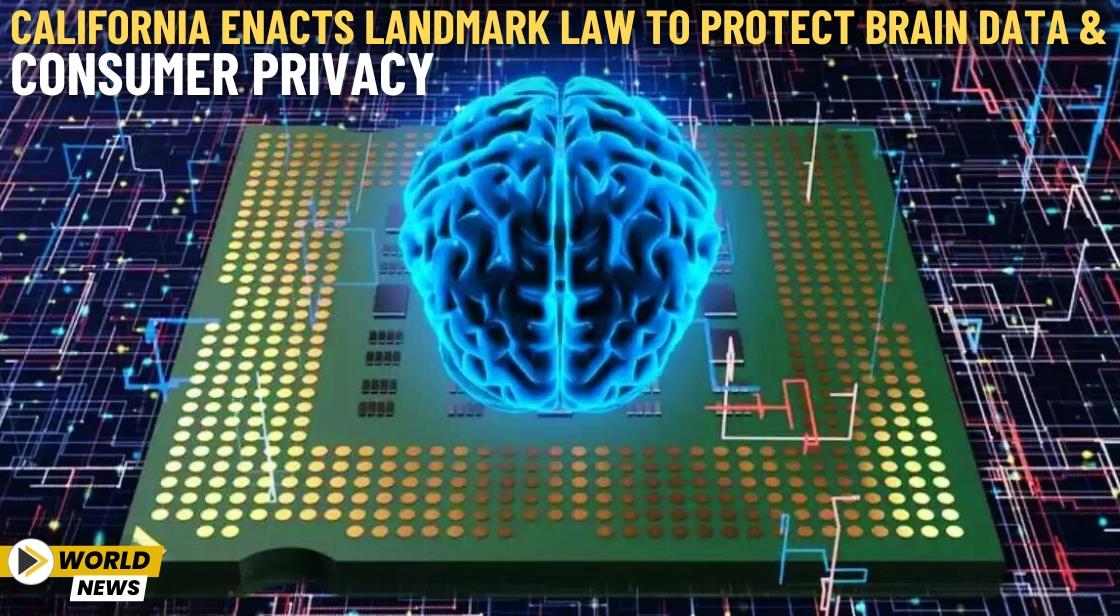California Enacts Landmark Law to Protect Brain Data and Consumer Privacy

News Synopsis
In a pioneering move to safeguard consumer privacy, California has enacted a new law that extends privacy protections to brainwave data collected from implants or wearable devices. Governor Gavin Newsom signed the legislation into law, marking an important amendment to the California Consumer Privacy Act (CCPA).
This latest development is aimed at classifying "neural data" as protected personal information, placing it in the same category as geolocation, genetics, and biometrics data, and further strengthening California's status as a leader in privacy rights.
The new law addresses growing concerns over the protection of sensitive brainwave data as neurotechnology advances at a rapid pace, with devices capable of reading and influencing neural activity becoming more prevalent. This action also places California alongside Colorado in the emerging movement to regulate brainwave data privacy, providing a framework that other states may soon follow.
A Victory for Consumer and Patient Privacy
The Neurorights Foundation, an organization focused on protecting mental privacy, played a key role in co-sponsoring the bill alongside a California state senator. Medical director Sean Pauzauskie hailed the law as "an enormous victory" for both patients dealing with mental health disorders and for consumers interested in neurotechnology to enhance their lives.
"The essential privacy guardrails it ensures should only boost confidence in all varieties of these revolutionary neurotechnologies, the great majority which are based in California," Pauzauskie stated. This statement underscores the critical need to establish boundaries that protect consumer privacy while encouraging innovation within the neurotechnology sector, most of which is headquartered in California.
Leading the Way in Neural Data Protection
With this legislation, California becomes the second U.S. state to enact such comprehensive brainwave data privacy protections, following Colorado, which earlier passed similar legislation requiring safeguards for neural data, much like those applied to fingerprints and other biometrics.
Jared Genser, general counsel for the NeuroRights Foundation, praised the new law, emphasizing its importance in sending "a clear signal to the fast-growing neurotechnology industry" about the need to prioritize mental privacy. Genser also advocated for the development of a national brainwave data privacy law, highlighting the necessity for broader protections beyond state-level initiatives.
Key Provisions of the California Brain Data Law
The newly enacted law provides several important consumer protections regarding brain data. Under the law, consumers now have the right to:
-
Know what brain data is being collected.
-
Limit the disclosure of their neural data to third parties.
-
Opt-out of brainwave data collection.
-
Request the deletion of their neural data.
These protections apply to devices capable of recording or altering activity in the nervous system, including both implanted and wearable devices. The potential risks associated with such devices — including the possibility of manipulating thoughts or emotions — have raised ethical and legal concerns, which the new law aims to address.
The NeuroRights Foundation has pointed out that, in the coming years, neural data's sensitivity is likely to increase alongside growing investments in the field of neurotechnology. As brain scan resolutions improve and datasets of brainwave data expand, the potential for misuse or exploitation will rise, making these protective measures even more critical.
The Future of Neurotechnology: Opportunities and Risks
Neurotechnology, especially in California, is seeing significant advancements, with major players like Elon Musk's Neuralink leading the charge. Musk's vision for Neuralink involves not only restoring functions like sight for the blind but also pushing the boundaries of human ability by offering enhancements like infrared or ultraviolet vision. He even imagines a future where people could share concepts telepathically.
"We want to give people superpowers," Musk famously said. "Not just that we're restoring your prior functionality, but that you actually have functionality far greater than a normal human." Such transformative technologies bring about exciting possibilities but also raise the stakes when it comes to protecting personal data, as the line between enhancing human abilities and invading personal privacy becomes increasingly blurred.
Conclusion
The enactment of the California brain data law represents a significant milestone in consumer privacy protection in the rapidly advancing field of neurotechnology. As devices capable of interacting with the human nervous system become more sophisticated, it is critical to ensure that privacy safeguards evolve in parallel. The law serves as a model for future legislation, both in the U.S. and globally, as policymakers and industry leaders seek to balance the potential benefits of neurotechnology with the need to protect individual rights.









